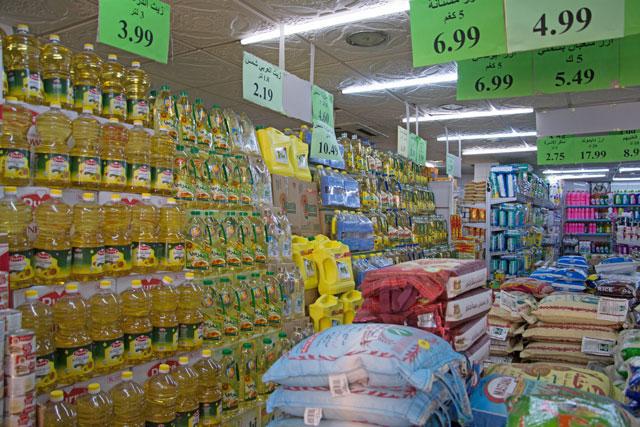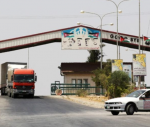You are here
Prime minister issues directives to ensure sufficient supply of basic commodities
By JT - Nov 08,2021 - Last updated at Nov 08,2021

Prime Minister and Minister of Defence Bisher Al Khasawneh on Monday directed the Ministry of Industry, Trade and Supply to intensify inspections and activate the regulatory mechanisms to ensure the availability of basic commodities at fair prices (File photo)
AMMAN — Prime Minister and Minister of Defence Bisher Al Khasawneh on Monday directed the Ministry of Industry, Trade and Supply to intensify inspections and activate the regulatory mechanisms to ensure the availability of basic commodities at fair prices, the Jordan News Agency, Petra, reported.
Khasawneh stressed the need to take necessary measures to tackle any violations or practices that violate the law, directing the concerned authorities to intensify daily inspections in all governorates of the Kingdom for this purpose.
The government acknowledges the rise in freight charges and imported goods from their source, he said, highlighting the need for a just profit margin, taking into account the exceptional circumstances that affected supply chains around the world.
The PM’s remarks came during a meeting attended by Minister of Agriculture Khalid Hneifat, Finance Minister Mohamad Al-Ississ, Minister of Industry, Trade and Supply Yousef Shamali, the secretaries and general managers of a number of ministries and relevant governmental institutions, the Aqaba Special Economic Zone Authority (ASEZA), and representatives of trade and industrial sectors.
The meeting focused on following up on the strategic stockpile of basic commodities and measures taken to maintain stability in local prices in light of the rise in product prices globally and the rise in freight rates.
The meeting comes in implementation of the directives of the prime minister to work on taking measures that will facilitate the smooth arrival of basic commodities, increase stock of basic commodities and provide support to the private sector, which contributes to alleviating financial burdens.
Shamali stressed the importance of maintaining local price stability during this period to ease the burdens on the public, highlighting governmental measures taken to reduce the costs of imported goods and speed up clearance procedures.
He said that the Ministry of Industry, Trade and Supply monitors on a daily basis the status of commodities in the local market and changes in prices globally.
The ministry partners with the trade and industrial sectors to reduce the repercussions of global rises on the local market and take the necessary measures to reduce costs on importers and local producers, the minister said.
A set of recommendations were made to expedite and facilitate clearance procedures by increasing official working hours even during public holidays, reducing fees of inspections and permits charged by ASEZA, as well as unifying the work of relevant authorities granting entry approvals after the inspection of goods.
In turn, Hneifat said that the Ministry of Agriculture will take the necessary measures to facilitate the import of agricultural products, adding that the necessary inspection of these commodities will be entrusted to the Jordan Food and Drug Administration.
Al-Ississ stressed that the government will not impose any taxes or fees during the coming period, and that the Ministry of Finance is ready to consider the demands of the trade sector in regard to the fees imposed on basic food commodities.
Representatives of the Central Bank of Jordan announced the bank’s decision to raise the ceiling of financing provided by local banks to the trade sector to reach JD600,000 instead of JD350,000 for wholesale trade, JD200,000 instead of JD175,000 for retail trade and extend it until June 2022.
Chairman of the Jordan Chamber of Commerce Nael Kabariti said that the trade sector is working hard to limit the effect of the rise in global prices on the local market, as well as sustaining the supply of goods from different origins.
Chairman of the Amman Chamber of Commerce Khalil Al Hajj Tawfiq and representatives of the trade sector presented a number of demands and proposals that would contribute to reducing prices, increasing food stockpiles and the possibility of establishing a national council for food security.
Representatives of the industrial sector also demanded banks to provide liquidity for the purpose of providing basic raw materials needed for local manufacturing.
Participants agreed to hold periodic meetings to follow up on proposals submitted by the private sector in order to facilitate and expedite the procedures for importing foodstuffs in a way that serves public interest and reflects positively on people.
Related Articles
AMMAN — The global price hike of essential commodities will not affect the local market during Ramadan, according to Yanal Barmawi, the Mini
AMMAN — The Council of Ministers on Wednesday approved a series of procedures to limit the rise in the prices of basic commodities in the lo
AMMAN — Minister of Industry, Trade and Supply Maha Al Ali on Thursday said that the strategic stock of basic foodstuff is sufficient for at















